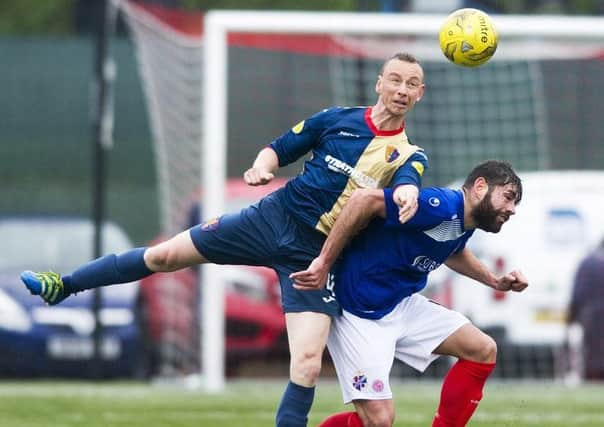Aidan Smith: Pyramid play-off system raises big questions


But Forest Green are England’s sparkliest, shiniest, newest team, having won the play-off to enter the Football League next season. Meanwhile, we await the prospect of real, momentous epoch-making change in the game: the banishing of Cowdenbeath and the brazen emergence of East Kilbride.
It could happen. The Blue Brazil blew the chance to take a lead into Saturday’s almighty showdown at Central Park when they missed a penalty in the first leg of the now annual jolt to Scotland’s established order. But should it happen?
Advertisement
Hide AdAdvertisement
Hide AdLots of us were in favour of the Pyramid play-offs when it was introduced two seasons ago but when the system throws up a clash of such dramatic contrast between old and new it starts to be questioned.
Cowdenbeath are older than Celtic who sing about their history, and how no other club has a back-story quite like theirs, every week. Founded in 1881, their name travels far and wide through the football world, or at least the nickname does, and perhaps all the way to Brazil.
East Kilbride on the other hand are as new as they come. They belong to a new town, even if it was the first in Scotland to show off its trim homes and many roundabouts in a Home Office public information film, voiced by a man with a posh English accent who’d never choose to live within a thousand miles of South Lanarkshire.
The date “1871” on the badge refers to the original East Kilbride who stuttered and wheezed during the game’s formative years, participating in the Scottish Cup before calling it a day. The name was revived in 2010 and the cup, and a highly lucrative tie against Celtic last season, was to play a big part in the new team’s charge to the Lowland League title.
It’s not East Kilbride’s fault they don’t have any history, and certainly not one to match that of Cowdenbeath. Give us this chance, they’re saying, and we’ll build one. All they can bring to Central Park is their ambition, which is obviously considerable.
What’s wrong with the meritocracy of the Pyramid? Nothing in principle, but having established the system, are there really lots of clubs out there with the stadia, the support, the finances – and the ambition – to attempt to follow East Kilbride?
Spartans might fancy becoming a league club and presumably East Stirlingshire, demoted at this stage last season, would love to be one again. Maybe a couple of Highland teams possess the capabilities and the desire. But beyond that, how many more? How long before the best of the rest knock on the door with a timid tap, perfectly happy in a scene meeting all their needs, not really wanting to go up?
Imagine Spartans arriving with Edinburgh City having properly established themselves. Could the capital really support four senior teams? Meadowbank Thistle couldn’t survive, for all that they missed out on the top flight because of league reconstruction, for all Terry Christie’s dutiful, duffle-coated stewardship, and for all that a small, eccentric band of supporters fought against them turning into Livingston. Only when prog-rock virtuoso Rick Wakeman’s got a new record to promote and he’s interviewed by The Scotsman can Meadowbank be sure of any more namechecks.
Advertisement
Hide AdAdvertisement
Hide AdWhy shouldn’t the wee guys get a shot at the big time? If the same serial failures had been finishing bottom of the bottomest every year, then the case for the Pyramid gains ground.
Over the last ten seasons East Stirlingshire came 42nd out of 42 on four occasions and eventually this caught up with them. But Montrose reacted to the jolt of being the first league club to appear in the shootout by getting their act together and, in the campaign just ended, winning a play-off place at the other end of League 2. Queen’s Park, bottom the season before, have just finished in the top half of League 1.
Maybe the kick up the backside provided by the trapdoor threat is another pro-Pyramid argument, but what of Cowdenbeath? The emotional argument comes into play with this club. They are known and admired and, yes, possibly patronised far beyond West Fife. This is due in a large part to a classic of football literature, Black Diamonds and the Blue Brazil, written by a rabid reverend, Ron Ferguson. Now retired from the church and living in Orkney, he’s even managed to eke out a second book on his beloved club and at 77 still makes the long pilgrimage to Central Park via choppy ferry crossings and 13-hour bus journeys.
Cowdenbeath are the music-hall joke which has long outlasted the demise of variety theatre. Their strange kind of fame hasn’t put many more fans on the gate and their plummet down the leagues has been dramatic. But spare a thought for them on Saturday and, if you like, say a prayer, too.